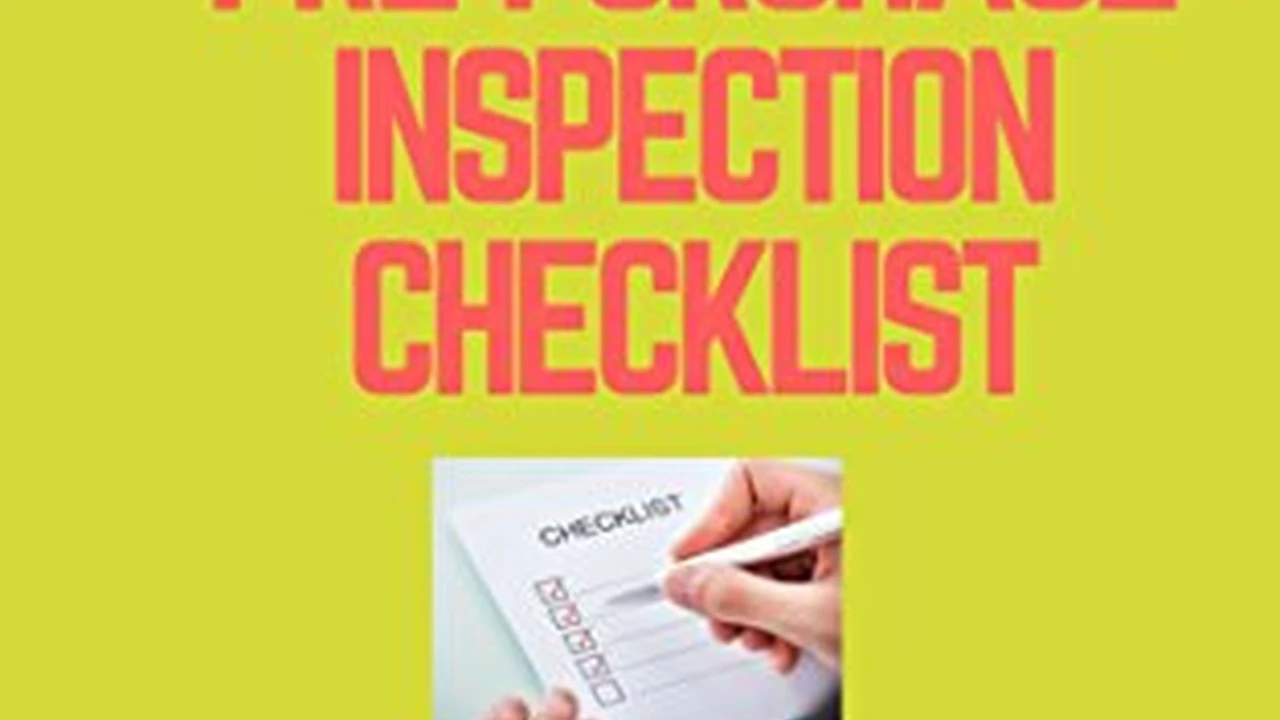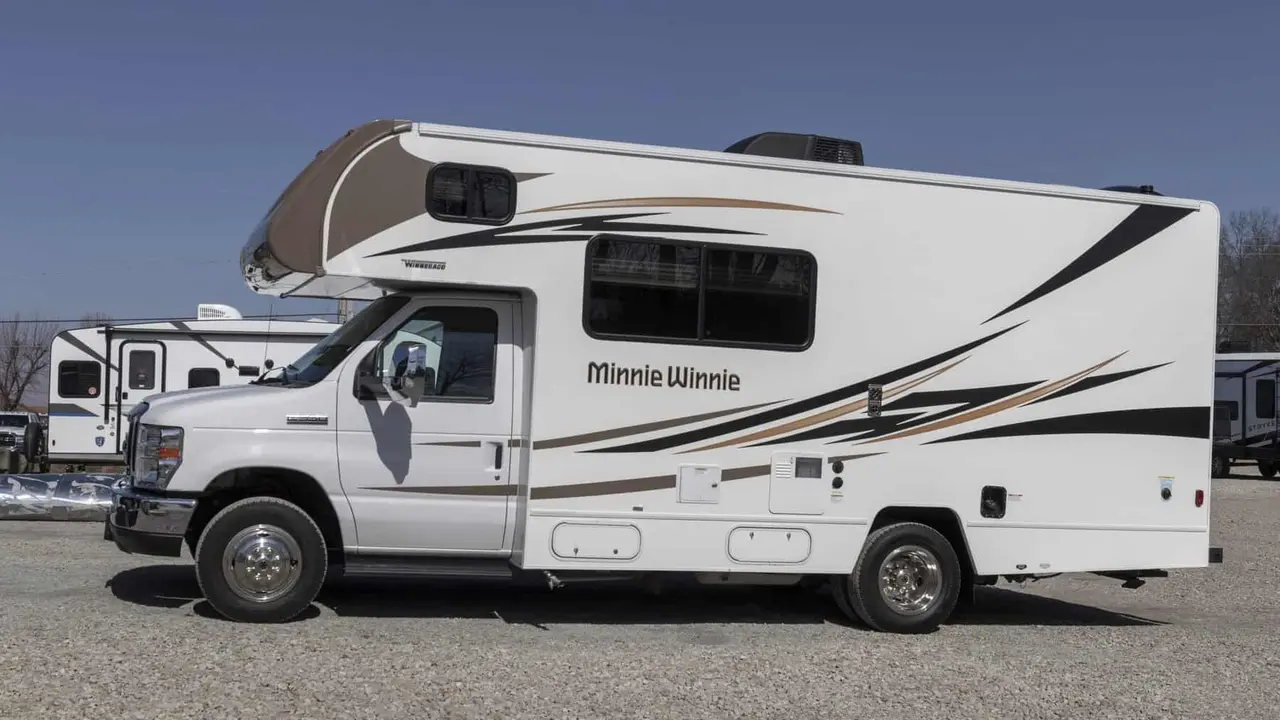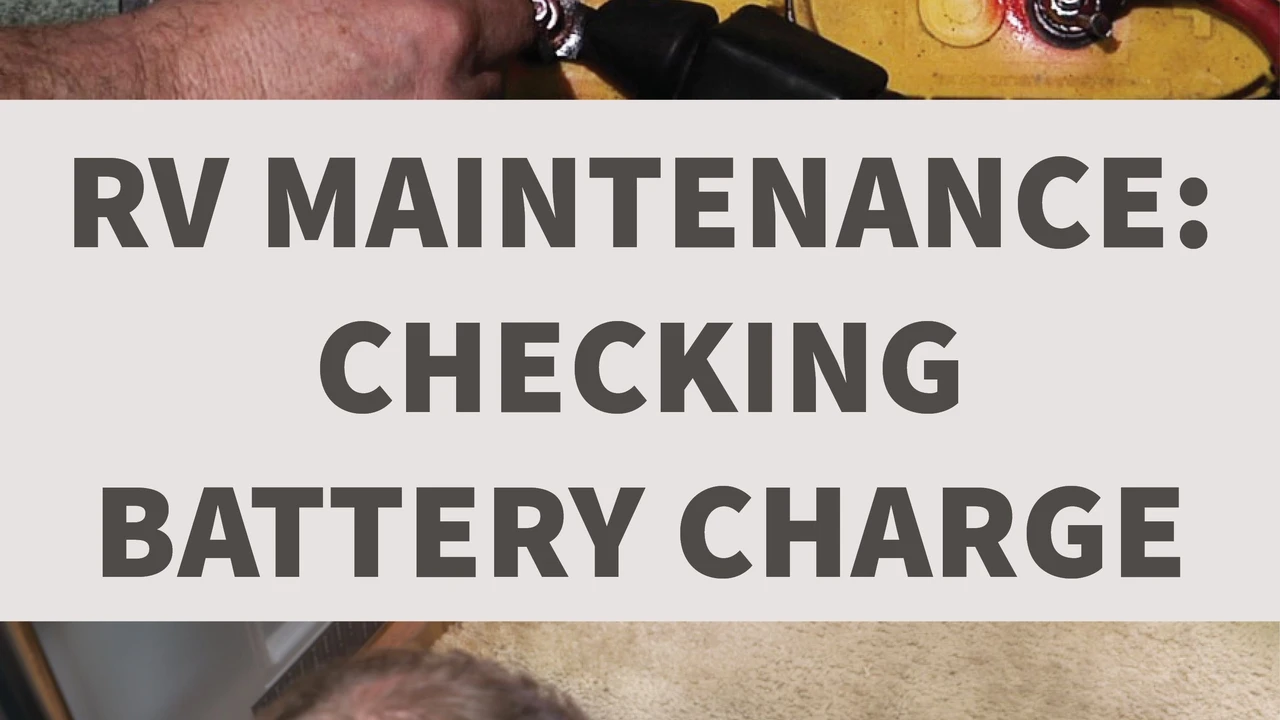RV Pre-Purchase Inspection: Essential Steps to Take

Understanding The Importance Of A Thorough RV Inspection Before Purchase
Buying an RV is a significant investment, and like any major purchase, it's crucial to do your due diligence. Imagine yourself on the open road, enjoying the freedom and adventure that RV life offers. Now, imagine that dream being shattered by unexpected repairs and hidden problems. A pre-purchase RV inspection can be the difference between a dream vacation and a financial nightmare. It's not just about kicking the tires; it's about ensuring the RV is structurally sound, mechanically sound, and safe for you and your family.
Think of it like buying a used car. You wouldn't drive off the lot without a mechanic checking it out, would you? An RV is even more complex than a car, with plumbing, electrical systems, appliances, and often, slide-outs. These systems can hide a multitude of problems, from minor inconveniences to major safety hazards. A professional inspection can uncover these issues before you commit to the purchase, giving you the leverage to negotiate repairs or walk away from a bad deal.
Ignoring the pre-purchase inspection is a gamble. You could be inheriting someone else's problems, facing costly repairs down the road, or even putting your safety at risk. Don't let the excitement of owning an RV cloud your judgment. Take the time to invest in a thorough inspection; it's an investment in your peace of mind.
Comprehensive RV Inspection Checklist Essential For Buyers
So, what exactly does a comprehensive RV inspection entail? It goes far beyond a simple visual check. A qualified RV inspector will examine every aspect of the RV, from the roof to the tires, looking for potential issues that could impact its value and safety. Here's a breakdown of the key areas covered in a typical inspection:
- Exterior Inspection: This includes checking the roof for leaks, damage, and proper sealing. The inspector will also examine the sidewalls for dents, scratches, and delamination. They'll assess the condition of windows, doors, and storage compartments, ensuring they are properly sealed and functioning correctly.
- Interior Inspection: Inside the RV, the inspector will check the condition of cabinets, flooring, and upholstery. They'll test all appliances, including the refrigerator, stove, oven, microwave, and water heater. They'll also inspect the plumbing system for leaks and proper drainage.
- Electrical System Inspection: This is a critical area, as electrical problems can be dangerous. The inspector will check the wiring, outlets, and circuit breakers. They'll also test the generator (if equipped) and the batteries.
- Plumbing System Inspection: The inspector will pressure test the water system to check for leaks. They'll also inspect the holding tanks and drainage system.
- LP Gas System Inspection: This involves checking the LP gas lines and appliances for leaks and proper operation. This is a safety-critical inspection.
- Chassis and Undercarriage Inspection: The inspector will examine the frame, suspension, brakes, and tires. They'll also check for rust and corrosion.
- Safety Features Inspection: This includes checking the smoke detectors, carbon monoxide detectors, and fire extinguishers.
- Slide-Out Operation and Sealing: If the RV has slide-outs, the inspector will ensure they operate smoothly and seal properly.
This checklist provides a general overview. A thorough inspection will be tailored to the specific type and age of the RV. It's essential to find a qualified inspector who has experience with the type of RV you're considering.
Finding A Qualified RV Inspector Near You Essential Tips
Finding the right RV inspector is crucial. You want someone who is knowledgeable, experienced, and unbiased. Here are some tips to help you find a qualified inspector:
- Ask for Referrals: Start by asking friends, family, or other RV owners for recommendations. Online RV forums and social media groups can also be valuable resources.
- Check Credentials and Certifications: Look for inspectors who are certified by reputable organizations, such as the National RV Inspectors Association (NRVIA) or the RV Inspection Connection (RVIC). These certifications indicate that the inspector has met certain standards of training and experience.
- Review Experience and Expertise: Choose an inspector who has experience with the type of RV you're considering. An inspector who specializes in travel trailers may not be the best choice for inspecting a Class A motorhome.
- Read Reviews and Testimonials: Check online reviews and testimonials to get a sense of the inspector's reputation and quality of work.
- Request a Sample Report: Ask the inspector to provide a sample report so you can see the level of detail and thoroughness they provide.
- Ask About Insurance and Liability: Ensure the inspector carries adequate insurance to cover any potential damages that may occur during the inspection.
- Compare Pricing: Get quotes from multiple inspectors and compare their pricing. However, don't choose solely based on price. The cheapest inspector may not be the most qualified.
- Communicate Your Concerns: Be sure to communicate any specific concerns you have about the RV to the inspector before the inspection begins.
Remember, a thorough inspection is an investment in your peace of mind. Don't cut corners when it comes to finding a qualified inspector.
Essential Tools And Equipment Used During RV Inspections
RV inspectors utilize a variety of tools and equipment to conduct a thorough inspection. These tools help them identify potential problems that may not be visible to the naked eye. Here are some of the common tools used during RV inspections:
- Moisture Meter: This tool measures the moisture content in walls and ceilings, helping to detect leaks and water damage.
- Infrared Camera: An infrared camera can detect temperature differences, which can indicate leaks, insulation problems, or electrical issues.
- Gas Leak Detector: This device detects leaks in LP gas lines and appliances.
- Electrical Tester: An electrical tester is used to check the voltage and continuity of electrical circuits.
- Tire Pressure Gauge: A tire pressure gauge ensures the tires are properly inflated.
- Brake Tester: A brake tester assesses the performance of the RV's brakes.
- Level: A level is used to check the RV's levelness, which can indicate structural problems.
- Ladder: A ladder is necessary to access the roof and other hard-to-reach areas.
- Inspection Mirror: An inspection mirror allows the inspector to see behind objects and in tight spaces.
- Digital Camera: A digital camera is used to document any findings and provide visual evidence in the inspection report.
The specific tools used may vary depending on the type of RV and the inspector's expertise. However, a qualified inspector will have the necessary tools to conduct a thorough and accurate inspection.
Understanding The RV Inspection Report Essential Details
After the inspection is complete, you'll receive a detailed report outlining the inspector's findings. This report is a valuable tool for making an informed decision about whether to purchase the RV. Here's what you should expect to find in a typical RV inspection report:
- Executive Summary: This provides a brief overview of the inspector's findings, highlighting any major issues or concerns.
- Detailed Findings: This section provides a detailed description of each item inspected, including any deficiencies or problems identified.
- Photographs: The report should include photographs of any issues or areas of concern.
- Recommendations: The inspector may provide recommendations for repairs or further evaluation.
- Cost Estimates: Some inspectors may provide cost estimates for repairs, but it's always a good idea to get multiple quotes from qualified repair shops.
- Limitations: The report should clearly state any limitations of the inspection, such as areas that were not accessible or items that could not be tested.
When reviewing the report, pay close attention to the executive summary and any major issues identified. Don't hesitate to ask the inspector for clarification on anything you don't understand. The report is your guide to understanding the RV's condition and potential problems.
Negotiating Repairs Or Price Based On Inspection Findings Essential Strategies
The inspection report provides you with valuable information that you can use to negotiate repairs or a lower price with the seller. Here are some strategies for negotiating based on the inspection findings:
- Prioritize the Issues: Focus on the most significant issues, such as structural problems, safety hazards, or major mechanical repairs.
- Get Multiple Repair Quotes: Obtain multiple quotes from qualified repair shops to get an accurate estimate of the repair costs.
- Present the Evidence: Provide the seller with a copy of the inspection report and the repair quotes.
- Be Realistic: Be prepared to compromise. The seller may not be willing to fix everything, but they may be willing to lower the price to compensate for the repairs.
- Know Your Walk-Away Point: Determine your walk-away point before you begin negotiations. If the seller is unwilling to address the major issues, be prepared to walk away from the deal.
- Consider an "As-Is" Agreement: If the seller is unwilling to make any repairs or lower the price, you may consider purchasing the RV "as-is." However, be sure you understand the risks involved and are prepared to handle any potential repairs.
- Get it in Writing: Any agreements made with the seller should be documented in writing and included in the purchase agreement.
Negotiating can be challenging, but the inspection report gives you the leverage to negotiate a fair price or ensure that necessary repairs are made before you take ownership of the RV.
Essential RV Maintenance Tips After Purchase To Prevent Future Issues
Once you've purchased your RV, it's essential to maintain it properly to prevent future issues and extend its lifespan. Here are some essential maintenance tips:
- Regular Roof Inspections: Inspect the roof regularly for leaks, damage, and proper sealing. Repair any issues promptly to prevent water damage.
- Sealant Maintenance: Check the sealant around windows, doors, and vents regularly and reapply as needed.
- Tire Maintenance: Maintain proper tire pressure and inspect the tires for wear and damage. Replace tires as needed.
- Brake Maintenance: Have the brakes inspected and serviced regularly.
- Battery Maintenance: Clean and maintain the batteries regularly. Check the water levels in lead-acid batteries and add distilled water as needed.
- Plumbing System Maintenance: Flush the water heater annually to remove sediment. Sanitize the water system regularly.
- LP Gas System Maintenance: Have the LP gas system inspected annually for leaks and proper operation.
- Appliance Maintenance: Clean and maintain appliances according to the manufacturer's instructions.
- Awning Maintenance: Clean and inspect the awning regularly. Lubricate the awning arms and rollers.
- Winterization: Properly winterize the RV if you live in a cold climate to prevent damage from freezing temperatures.
Regular maintenance is key to preventing costly repairs and ensuring that your RV remains in good condition for years to come.
Recommended RV Inspection Services And Their Pricing Essential Comparison
Choosing the right RV inspection service can be daunting. Here's a comparison of some popular services, including their pricing and what they offer:
* **National RV Inspectors Association (NRVIA):** NRVIA is a professional organization that certifies RV inspectors. Pricing varies depending on the inspector's experience, location, and the type of RV being inspected. Expect to pay between $300 and $800 for a comprehensive inspection. NRVIA inspectors are certified and insured, providing a level of assurance. * **RV Inspection Connection (RVIC):** RVIC is another reputable organization that trains and certifies RV inspectors. Their pricing is similar to NRVIA, ranging from $300 to $800. RVIC inspectors follow a standardized inspection process, ensuring consistency. * **Lemon Squad:** Lemon Squad offers mobile RV inspection services in many areas. Their pricing is generally higher than NRVIA and RVIC, ranging from $500 to $1000. However, they offer a more convenient service, as they come to you. * **Independent RV Inspectors:** You can also find independent RV inspectors through online directories or referrals. Pricing can vary widely, so be sure to check their credentials and experience carefully.When choosing an RV inspection service, consider their certifications, experience, pricing, and availability. Read reviews and testimonials to get a sense of their reputation and quality of work.
The Cost Of RV Inspections Essential Factors To Consider
The cost of an RV inspection can vary depending on several factors:
* **Type of RV:** Larger and more complex RVs, such as Class A motorhomes, typically cost more to inspect than smaller travel trailers. * **Location:** Inspection costs may be higher in areas with a higher cost of living. * **Inspector's Experience:** More experienced and certified inspectors may charge more for their services. * **Scope of Inspection:** A more comprehensive inspection will typically cost more than a basic inspection. * **Travel Fees:** If the inspector has to travel a significant distance to reach the RV, they may charge travel fees.While it's tempting to choose the cheapest inspection service, remember that you get what you pay for. A thorough and accurate inspection can save you thousands of dollars in the long run by identifying potential problems before you purchase the RV.
Essential Legal Considerations Before Buying An RV
Before you finalize the purchase of your RV, it's important to consider some legal aspects to protect yourself:
* **Title Search:** Ensure the seller has a clear title to the RV and that there are no liens or encumbrances. * **Purchase Agreement:** Review the purchase agreement carefully before signing it. Make sure all terms and conditions are clearly stated, including the purchase price, payment terms, and any warranties. * **Warranty:** Understand the terms of any warranties offered by the seller or manufacturer. * **Insurance:** Obtain adequate insurance coverage for the RV before you take ownership. * **Registration and Licensing:** Register and license the RV in your state of residence. * **Sales Tax:** Be aware of any sales tax obligations in your state.Consult with an attorney or legal professional if you have any questions or concerns about the legal aspects of buying an RV.
Financing Options For RV Purchases Essential Information
Financing an RV purchase is a common practice. Here's some essential information about financing options:
* **RV Loans:** RV loans are typically offered by banks, credit unions, and RV dealerships. The interest rates and terms will vary depending on your credit score, the loan amount, and the lender. * **Secured vs. Unsecured Loans:** RV loans are typically secured loans, meaning the RV serves as collateral for the loan. Unsecured loans, such as personal loans, may also be an option, but they typically have higher interest rates. * **Down Payment:** A down payment is typically required for RV loans. The amount of the down payment will vary depending on the lender and your credit score. * **Loan Term:** RV loans typically have longer terms than auto loans, ranging from 5 to 20 years. * **Credit Score:** Your credit score will significantly impact the interest rate and terms you receive on an RV loan.Shop around for the best financing options and compare interest rates, terms, and fees. Consider getting pre-approved for a loan before you start shopping for an RV.
RV Insurance Coverage Essential Types To Protect Your Investment
RV insurance is essential to protect your investment and provide financial protection in case of an accident or other covered loss. Here are some essential types of RV insurance coverage:
* **Liability Coverage:** This covers bodily injury and property damage that you cause to others in an accident. * **Collision Coverage:** This covers damage to your RV caused by a collision with another vehicle or object. * **Comprehensive Coverage:** This covers damage to your RV caused by events other than a collision, such as theft, vandalism, fire, or natural disasters. * **Uninsured/Underinsured Motorist Coverage:** This covers your medical expenses and other damages if you are injured in an accident caused by an uninsured or underinsured driver. * **Personal Property Coverage:** This covers the loss or damage to your personal belongings inside the RV. * **Roadside Assistance:** This provides coverage for towing, jump starts, tire changes, and other roadside services.Shop around for the best RV insurance rates and compare coverage options. Consider your individual needs and budget when choosing your insurance coverage.
Essential Safety Tips For Operating An RV On The Road
Operating an RV safely requires careful planning and attention to detail. Here are some essential safety tips:
* **Pre-Trip Inspection:** Perform a thorough pre-trip inspection of the RV before each trip. Check the tires, brakes, lights, and other essential systems. * **Weight Distribution:** Distribute the weight evenly throughout the RV to maintain stability. * **Tire Pressure:** Maintain proper tire pressure. * **Speed Limits:** Obey speed limits and adjust your speed for weather conditions. * **Following Distance:** Maintain a safe following distance. * **Turning Radius:** Be aware of the RV's turning radius and allow extra room when making turns. * **Height Restrictions:** Be aware of height restrictions and avoid low bridges or overpasses. * **Braking:** Allow extra time for braking. * **Wind Conditions:** Be aware of wind conditions and adjust your driving accordingly. * **Fatigue:** Avoid driving when fatigued. Take frequent breaks.Safe driving is essential for enjoying your RV adventures. Take the time to learn the proper techniques for operating an RV and always prioritize safety.
Essential RV Camping Etiquette For Responsible Travelers
RV camping is a great way to experience the outdoors, but it's important to be a responsible traveler and respect your fellow campers. Here's some essential RV camping etiquette:
* **Quiet Hours:** Observe quiet hours and keep noise levels to a minimum. * **Campsite Boundaries:** Respect campsite boundaries and avoid encroaching on neighboring campsites. * **Pet Etiquette:** Keep your pets on a leash and clean up after them. * **Campfire Safety:** Follow campfire safety rules and never leave a campfire unattended. * **Trash Disposal:** Dispose of trash properly and leave your campsite clean. * **Water Conservation:** Conserve water and avoid wasting water resources. * **Generator Use:** Limit generator use and be considerate of your neighbors. * **Respect Nature:** Respect nature and avoid damaging vegetation or disturbing wildlife. * **Be Friendly:** Be friendly and courteous to your fellow campers.By following these simple guidelines, you can help ensure a positive and enjoyable camping experience for everyone.
Essential RV Resources And Communities For Owners
Being an RV owner comes with a unique set of challenges and rewards. Fortunately, there are many resources and communities available to help you along the way:
* **Online Forums:** Online RV forums, such as iRV2 and RV.net, are great places to ask questions, share information, and connect with other RV owners. * **Social Media Groups:** Social media groups, such as Facebook groups, are another great way to connect with other RV owners and get advice. * **RV Clubs:** RV clubs, such as Good Sam and Escapees, offer discounts, benefits, and social events for RV owners. * **RV Dealerships:** RV dealerships are a valuable resource for maintenance, repairs, and parts. * **RV Repair Shops:** RV repair shops specialize in repairing and maintaining RVs. * **RV Blogs and Websites:** RV blogs and websites provide valuable information about RV travel, maintenance, and lifestyle.These resources can help you learn about RV ownership, connect with other RV owners, and get the support you need to enjoy your RV adventures.
RV Pre Purchase Inspection Conclusion Essential Takeaways
Investing in an RV pre-purchase inspection is an investment in your future peace of mind. It helps you avoid costly surprises, negotiate a fair price, and ensure that you're buying a safe and reliable RV. By following the steps outlined in this guide, you can make an informed decision and enjoy the freedom and adventure that RV life offers.
:max_bytes(150000):strip_icc()/277019-baked-pork-chops-with-cream-of-mushroom-soup-DDMFS-beauty-4x3-BG-7505-5762b731cf30447d9cbbbbbf387beafa.jpg)





